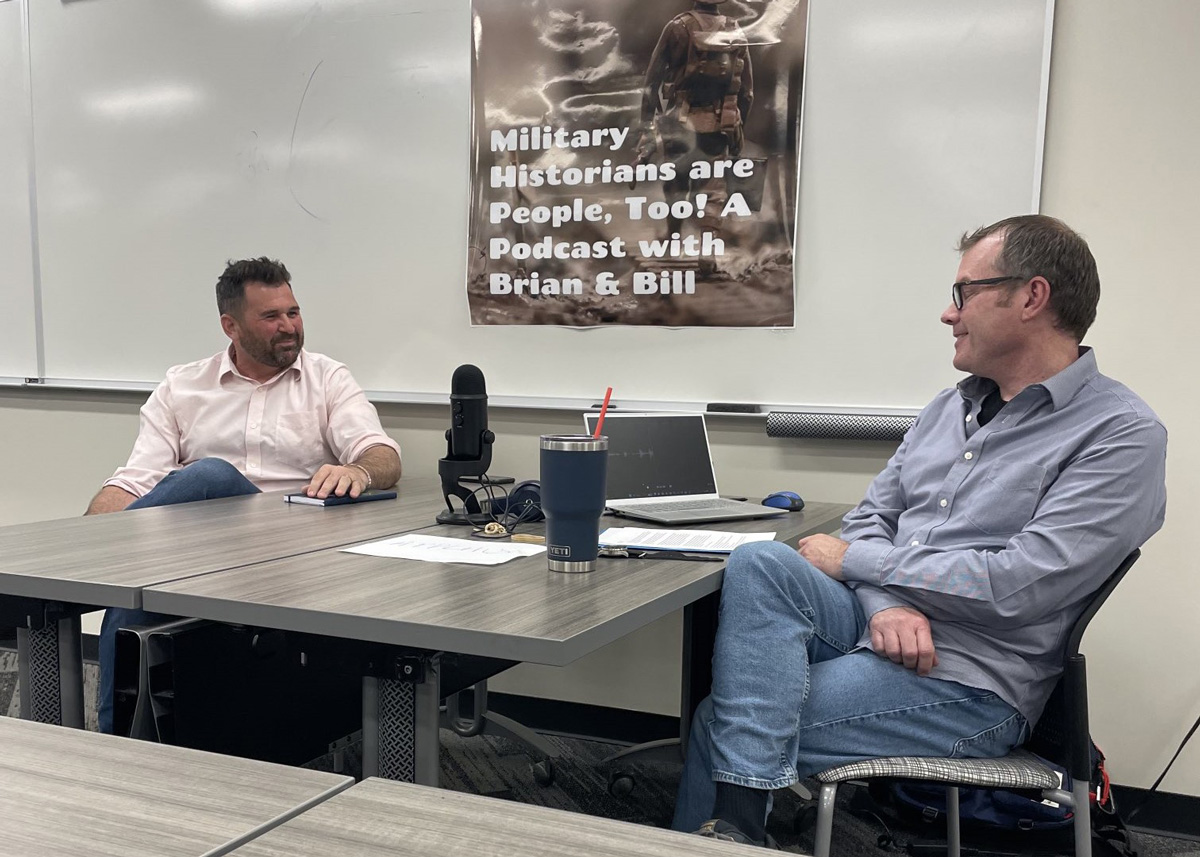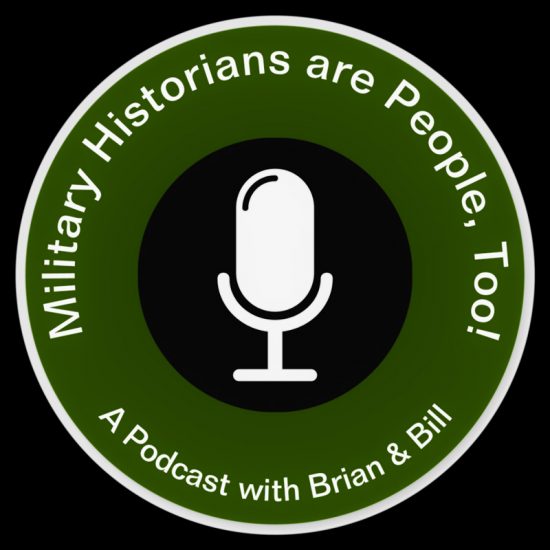Military Historians Are People, Too!
Georgia Southern Podcast Brings Military History to Global Audience

In a small corner of Georgia Southern University’s Statesboro Campus, two esteemed historians are making waves in the world of military history through their podcast series. Bill Allison, Ph.D., and Brian Feltman, Ph.D., both with vast knowledge and infectious passion for the subject, have successfully bridged the gap between academia and entertainment. The two professors reach a wide audience with their unique blend of interviews and engaging discussions. With over 17,000 total plays, a loyal following and a growing fanbase, their podcast has become a platform for showcasing the personal journeys and experiences of military historians and scholars.
After teaching for a decade away from the Southeast, Feltman found himself returning to the South when he joined Georgia Southern University in 2012. As a specialist in modern German history, with a particular focus on the First World War and society, Feltman’s passion for military history had been growing since his childhood in South Carolina.
“I always had an interest in all things military and then became a German historian and those two interests really collided,” said Feltman. “And then I became a really big fan of podcasts a couple of years ago.”
Growing up in Texas, Allison joined Georgia Southern in 2008. His passion for history stemmed from his father’s service in the Marine Corps during the Vietnam War. Allison’s early exposure to historic sites and films nurtured his interest, which eventually led him to pursue a career in military history.
The Birth of Military Historians Are People, Too
One fateful day, Allison approached Feltman with an idea inspired by the podcasts that he enjoyed during his commute.
“I had this idea of long form podcast interviews with people,” said Allison. “Because I think in long form, you can really get to know somebody, get to know their background and how they got interested in whatever they’re doing.”
The vision was to delve into the lives and experiences of military historians and scholars, showcasing their personal stories and shedding light on the individuals behind the scholarly works. With Feltman’s immediate enthusiasm, the podcast was set in motion.
Though they had limited knowledge of podcast production, Allison and Feltman embraced the challenge, relying on online tutorials and the support of their network.
Their Guests Are Big Names
Allison and Feltman began by reaching out to friends and colleagues in the field, gradually expanding their guest list to include military historians and scholars from around the world. They have grown their guest list to include some of the biggest names in the field.
“It’s people we meet, people we know, but people we don’t know that we come across or people recommend to us,” said Allison. “We’ve had a couple of publishers get in touch with us, somebody who’s got a book coming out and things like that. There are no degrees of separation in this business.”
Going Beyond Academic Perspectives
Allison and Feltman’s interviews go far beyond academic achievements. They delve into childhood influences, formative experiences, and the multifaceted lives of their guests, humanizing these renowned experts in the eyes of the audience.
Recognizing the importance of presenting their guests as relatable individuals, Allison and Feltman devised a unique segment in their podcast called “Getting to Know You.” This rapid-fire section offers glimpses into their guests’ personal lives, exploring their current reading lists, favorite movies, and other interesting details. By going beyond the academic sphere, the hosts foster a deeper connection between the scholars and the audience.

“That’s the kind of thing we wanted to tap into, because we know them in terms of their scholarship, but there’s a person behind that,” said Feltman. “I imagine what we do is kind of ‘Inside the Actor’s Studio’ for military historians.”
Friendly Competition
Allison and Feltman are two funny and engaging guys, and it shows up in their interview style. For example, they have an ongoing battle between what state has the best barbecue on the podcast.
“You know, Bill and I have always argued about barbecue with me being from South Carolina and Bill being from Texas,” said Feltman. “And that shows up regularly on our podcast, that’s why there are always pictures of us eating barbeque on our website.”
From Academia to Podcast Fame
“Military Historians Are People Too” has transformed Allison and Feltman into recognizable personalities within the military history community and beyond. Their podcast has opened doors to new opportunities, including guest appearances on other podcasts and collaboration requests from renowned military historians.
The unexpected journey from academia to podcast fame has provided Allison and Feltman with a platform to showcase the human side of military history and relating scholars to the general public. They are now more recognized by students for their podcast than for their academics.
Global Reach
Garnering around 200 to 250 plays per episode, the show has surpassed Allison’s and Feltman’s initial expectations. Its impact has reached far and wide, with enthusiastic listeners tuning in from all corners of the world, demonstrating the universal appeal of history and the hosts’ ability to connect with their audience.
Merging Academics with Storytelling
Through their podcast, Feltman and Allison have successfully merged academic expertise with relatable storytelling. By highlighting the personal journeys and experiences of military historians, they have captivated a global audience. Their podcast not only educates but also fosters a deeper understanding and appreciation of military history while showcasing the multifaceted lives of the experts behind it.
With their unique approach, Feltman and Allison continue to inspire and engage listeners, proving that military historians are indeed “people too.”
–– Liz Walker
